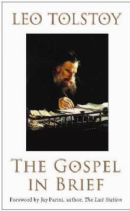Book: The Gospel in Brief by Leo Tolstoy

To understand Tolstoy is to grasp how Romanticism is always a frustrated realism. Tolstoy sought a moral and aesthetic realism. He expressed it in his novels and short stories. He was born into the privileged life of the Tsarist aristocracy and celebrated that life in his earliest novels, though with an undertone of protest at the evident injustice suffered by peasants. His gambling brought him into the army and the experience of military and political violence. He belonged to the generation of the most radical critique of human society ever attempted, the anarchism of Bakunin, Kropotkin and Herzen, exiled in Europe, and Prudhon in Paris. He was always a character in his own fiction.
After the matchless achievements of War and Peace, Anna Karenina and Resurrection, he grew dispirited and world-weary. He became aware that mere indifference to society's laws was no better a belief than that of his lawless class-contemporaries. As Jay Parini points out in the introduction to this remarkable and unique re-writing of the Gospels, Tolstoy now felt he had to live a real life. He rejected the violence of anarchism and sought to create a new society founded on secular Christian principles. This book first published in 1896, though written in the eighties, cast himself as Christ and the Orthodox Church as the Pharisees.
Instead of the Father, "man is the son of the infinite source of Being." Tolstoy re-lives the life of Christ as he struggles to overcome the fear, greed and hypocrisy of his society. In the end, Tolstoy -Christ breathes his last, just as the real Tolstoy was to die after setting out on a journey of renunciation at the fabled Astapovo Station. Yet Gandhi, Martin Luther King and Nelson Mandela all attribute their non-violent politics to him. Wittgenstein, many of whose brothers committed suicide, claimed the book kept him alive.
The Gospel in Brief, Leo Tolstoy tr. Isabel Hapgood, (1893) Foreword by Jay Parini, Darton, Longman and Todd. n.p. ISBN 978-0-232-52793-3.


















